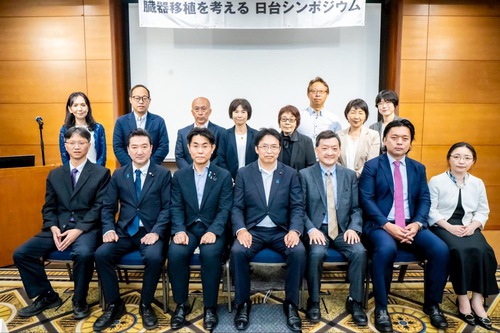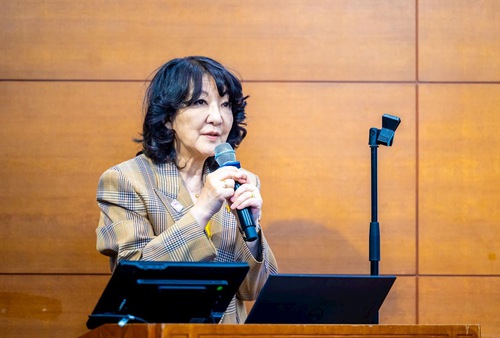(Minghui.org) Stop Medical Genocide – Society for the Study of Organ Transplantation in China and the Taiwan Association for International Care of Organ Transplants held the Organ Transplantation Japan-Taiwan Symposium in the Zenkoku Choson Kaikan Hotel, Tokyo, on June 5, 2025.
Experts and politicians from Japan, the United States, and Taiwan attended the meeting and reported on the current situation of the Chinese Communist Party’s (CCP) live organ harvesting from Falun Gong practitioners. Many well-known Japanese spoke, and mainstream media covered the event.
 Participants in the Organ Transplantation Japan-Taiwan Symposium
Participants in the Organ Transplantation Japan-Taiwan Symposium
U.S. Congressman: Tens of Thousands of Falun Gong Practitioners Are Killed Every Year
U.S. Congressman Chris Smith said in a written speech that tens of thousands of young people with an average age of 28 are killed every year because their organs are harvested in China. The victims include Uyghurs and Falun Gong practitioners. The CCP openly regards Falun Gong as a target of suppression and highly values their healthy organs.
Mr. Smith pointed out that, in 1999, China’s Ministry of State Security (MSS) launched its largest operation since the Cultural Revolution—the complete eradication of Falun Gong. In 2000, major hospitals across China significantly expanded their organ transplant facilities, and military hospitals explicitly targeted illegally detained Falun Gong practitioners for organ harvesting.
The Stop Forced Organ Harvesting Act of 2025 (H.R.1503), which he drafted, was passed by the U.S. House of Representatives last month by a vote of 406 to 1 and is now being submitted to the Senate for deliberation. According to the bill, fines of up to $1 million and up to 20 years in prison could be imposed on individuals involved in forced organ harvesting.
DAFOH Representative: Falun Gong Practitioners Are the Main Victims
Torsten Trey, founder of Doctors Against Forced Organ Harvesting (DAFOH), spoke about the results of his 18-year investigation. He said that China mainly harvests organs from prisoners of conscience, such as Falun Gong practitioners, leading to an estimated 30,000 to 50,000 organ transplants each year.
Dr. Trey also pointed out that, based on the facts revealed after 2006, the CCP realized that this tactic could effectively eradicate Falun Gong, so it expanded the number of transplant hospitals by four times and expanded its victims to include Uyghurs and other prisoners of conscience.
He criticized China’s unique “organs on demand” system: finding matching kidneys usually takes only two weeks, and for an additional $10,000, donors can be found within two days. This is the only transplant system in the world in which the organ recipients are effectively responsible for the deaths of their donors.
According to a 2024 survey by the Ministry of Health, Labor, and Welfare of Japan, 175 Japanese received organ transplants in China. Dr. Trey warned that this showed that Japanese had, in fact, been drawn into this criminal system.
Taiwan Legislative Reform Successfully Curbed Organ Transplant Tourism
Professor Tsai Fu-chang, director of the NTUH Ethics Center at National Taiwan University Hospital, reported on the effectiveness of Taiwan’s relevant laws.
“Transplant tourism” from Taiwan to China for organ transplants has increased dramatically since 2000, and more than 4,500 Taiwanese have received transplants in China over the past decade.
Taiwan has phased in response measures since 2006. In 2006, Taiwan completely banned medical personnel from participating in organ transplant brokerage activities. In 2015, Taiwan comprehensively revised the Human Organ Transplant Regulations so that patients receiving overseas transplants must submit detailed written information on the source of their organs, and at the same time, illegal brokers and related patients are subject to a maximum of five years in prison and a fine of US$50,000.
Dr. Wang Cheng-hsu, a Taiwan legislator and director of the Department of Hematology and Oncology at Chang Gung Memorial Hospital, also pointed out that the Taiwan Control Yuan has been able to effectively track patients who received organ transplants in China based on the use of immunosuppressants prescribed. This move has significantly reduced the number of transplant tourism cases from Taiwan to China.
Countries Push for Legislation to Counter China’s Organ Harvesting
Dr. Trey also laid out some of the legislative progress other countries have made. Israel banned insurance from paying for transplant operations in China in 2008, successfully ending the travel of Israelis to China for organ transplants. Italy added the crime of “live organ trading” in 2016, which stipulates a prison sentence of three to twelve years and permanent revocation of one’s medical license for violating the law.
In the United States, Texas passed legislation in 2023 to prohibit the inclusion of organ transplant expenses related to China in health insurance. Idaho, Utah, Tennessee, and Arizona have also passed similar laws. In May 2025, the House of Representatives passed the Falun Gong Protection Act (H.R.1540), explicitly suspending all cooperation with China in the field of organ transplantation and denying and revoking visas for participants. That legislation now has to be passed by the Senate and signed by the president for it to become law.
Lawmakers from Japan and Taiwan Express Support
 Senator Satsuki Katayama speaking at the symposium
Senator Satsuki Katayama speaking at the symposium
The symposium received support from Japanese and Taiwanese elected officials, including Japanese Liberal Democratic Party Senator Katayama Satsuki, Constitutional Democratic Party House of Representatives Yoshio Masuda, and House of Representatives member Rintaro Ishibashi. Former Japanese House of Representatives member Yasuhide Nakayama also sent a special message of support.
Taiwan legislators Lin Szu-ming, Chen Chao-tzu, Chen Kuan-ting, and the Taiwan Medical Association sent congratulatory messages.
Experts at the meeting unanimously recognized that, in order to stop the serious human rights violations committed under the CCP’s live organ harvesting program, medical and political circles must work together to execute prompt and effective countermeasures. The model established by Taiwan of gradually improving the relevant laws provides a practical example for Japan and other Asian countries to learn from.
All content published on this website is copyrighted by Minghui.org. Minghui will produce compilations of its online content regularly and on special occasions.
Category: Organ Harvesting









